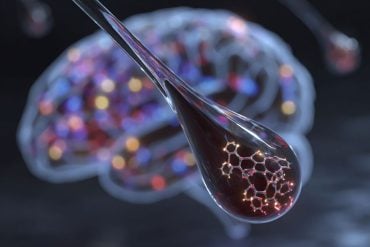Summary: A new study reveals maternal diet during pregnancy can have dramatic implications for fetal brain development and can impact short term memory in adults.
Source: University of Southampton.
Poor protein in a mother’s diet in early pregnancy, around the time of conception, can have a lasting effect on brain development, according to research recently published by University of Southampton academics.
The project, led by Dr Sandrine Willaime-Morawek, in collaboration with Professor Tom Fleming, is the first to clearly demonstrate that poor maternal nutrition during the first days of pregnancy in mice, known as the pre-implantation period, can have adverse effects on early brain development and long-lasting consequences in adults.
The paper, ‘Mouse maternal protein restriction during preimplantation alone permanently alters brain neuron proportion and adult short-term memory’, has been published in one of the world’s most cited and comprehensive multidisciplinary scientific journals – the Proceedings of the National Academy of Sciences of the United States of America (PNAS) – that publishes cutting-edge research, science news, commentaries, perspectives, colloquium papers and reviews.
The study using cell cultures and mice reveals that a maternal diet low in protein during this critical period around conception reduces the production of neural stem cells, the cells that make our nerve cells in the brain, leading to errors in the timing and number of nerve cells formed and ultimately resulting in poor short-term memory in the adult.
Whilst it is known that a mother’s diet during early pregnancy is crucial to a baby’s development, if it is poor, it increases the risk of diseases in the child’s later life such as cardiovascular diseases and schizophrenia.
Previous studies have shown that protein reduction in the diet during pregnancy and breastfeeding can damage the brain of the baby, leading to lasting effects for coordination and cognitive function. However, the importance of nutrition at the very start of pregnancy for brain development has been unknown, until now.
Dr Willaime-Morawek said: “I am delighted the study has been published. The paper represents years of work by a very hard-working PhD student Joanna Gould, and numerous medical and biomedical students in my team.
“Our original research shows that poor maternal nutrition from conception in a mouse model adversely affects brain development and adult memory.

“We also show that the pre-implantation period is key in determining adult phenotype and possibly even more so, the constancy of the environment pre- and post-implantation.
“Significant effects were found with only a mild nutritional challenge –half of the recommended protein amount – highlighting the significance of this period for adult health.”
The research builds on ongoing work in Developmental Origins of Health and Disease (DoHaD) at Southampton, and was carried out by academics from Clinical and Experimental Sciences and the Centre for Human Development, Stem Cells and Regeneration, in Medicine, as well as colleagues in Biological Sciences, and academics from the Centre for Biomarker Research at the University of Huddersfield.
Funding: The project was funded by Medicine, at the University of Southampton; theWessex Medical Research and Rosetrees Trust; the Biotechnology and Biological Sciences Research Council; the EU-FP7 EpiHealth programs; the Gerald Kerkut Trust; the Leonard Thomas Fund; the Dr Sanderson bursary; and the Wolfson Foundation.
Source: University of Southampton
Publisher: Organized by NeuroscienceNews.com.
Image Source: NeuroscienceNews.com image is credited to Willaime-Morawek et al.
Original Research: Abstract for “Mouse maternal protein restriction during preimplantation alone permanently alters brain neuron proportion and adult short-term memory” by Joanna M. Gould, Phoebe J. Smith, Chris J. Airey, Emily J. Mort, Lauren E. Airey, Frazer D. M. Warricker, Jennifer E. Pearson-Farr, Eleanor C. Weston, Philippa J. W. Gould, Oliver G. Semmence, Katie L. Restall, Jennifer A. Watts, Patrick C. McHugh, Stephanie J. Smith, Jennifer M. Dewing, Tom P. Fleming, and Sandrine Willaime-Morawek in PNAS. Published June 25 2018.
doi:10.1073/pnas.1721876115
[cbtabs][cbtab title=”MLA”]University of Southampton”Early Maternal Diet Affects Brain Development and Adult Memory.” NeuroscienceNews. NeuroscienceNews, 28 June 2018.
<https://neurosciencenews.com/maternal-diet-development-9463/>.[/cbtab][cbtab title=”APA”]University of Southampton(2018, June 28). Early Maternal Diet Affects Brain Development and Adult Memory. NeuroscienceNews. Retrieved June 28, 2018 from https://neurosciencenews.com/maternal-diet-development-9463/[/cbtab][cbtab title=”Chicago”]University of Southampton”Early Maternal Diet Affects Brain Development and Adult Memory.” https://neurosciencenews.com/maternal-diet-development-9463/ (accessed June 28, 2018).[/cbtab][/cbtabs]
Abstract
Mouse maternal protein restriction during preimplantation alone permanently alters brain neuron proportion and adult short-term memory
Maternal protein malnutrition throughout pregnancy and lactation compromises brain development in late gestation and after birth, affecting structural, biochemical, and pathway dynamics with lasting consequences for motor and cognitive function. However, the importance of nutrition during the preimplantation period for brain development is unknown. We have previously shown that maternal low-protein diet (LPD) confined to the preimplantation period (Emb-LPD) in mice, with normal nutrition thereafter, is sufficient to induce cardiometabolic and locomotory behavioral abnormalities in adult offspring. Here, using a range of in vivo and in vitro techniques, we report that Emb-LPD and sustained LPD reduce neural stem cell (NSC) and progenitor cell numbers at E12.5, E14.5, and E17.5 through suppressed proliferation rates in both ganglionic eminences and cortex of the fetal brain. Moreover, Emb-LPD causes remaining NSCs to up-regulate the neuronal differentiation rate beyond control levels, whereas in LPD, apoptosis increases to possibly temper neuron formation. Furthermore, Emb-LPD adult offspring maintain the increase in neuron proportion in the cortex, display increased cortex thickness, and exhibit short-term memory deficit analyzed by the novel-object recognition assay. Last, we identify altered expression of fragile X family genes as a potential molecular mechanism for adverse programming of brain development. Collectively, these data demonstrate that poor maternal nutrition from conception is sufficient to cause abnormal brain development and adult memory loss.






